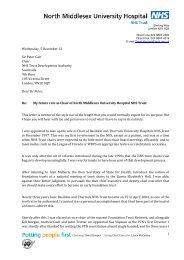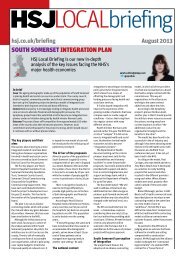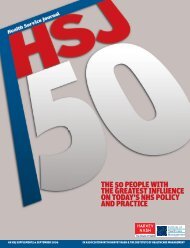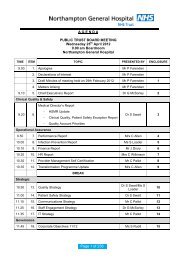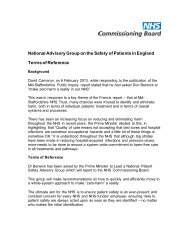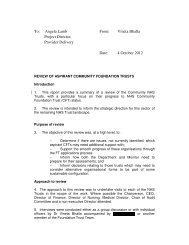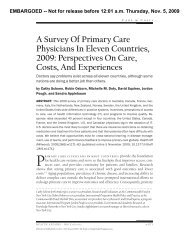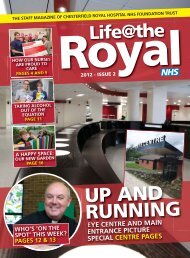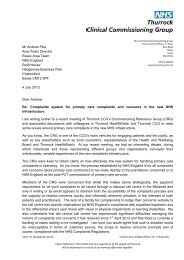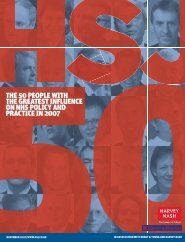Top leaders supplement - Health Service Journal
Top leaders supplement - Health Service Journal
Top leaders supplement - Health Service Journal
You also want an ePaper? Increase the reach of your titles
YUMPU automatically turns print PDFs into web optimized ePapers that Google loves.
first class<br />
ok like?<br />
‘all <strong>leaders</strong> need obvious<br />
weaknesses. Branson<br />
has scruffy sweaters<br />
and Churchill had “black<br />
dog” depressions’<br />
needs courage. Courage to overcome fear<br />
when your local MP threatens a<br />
parliamentary question, when your chair<br />
seems to have become the mouthpiece of a<br />
hostile strategic health authority, when a<br />
junior nurse brings you clear evidence of<br />
malpractice, when a bereaved relative<br />
threatens to call the might of the Daily Mail<br />
down on you.<br />
One client, faced with almost all of this at<br />
once and invited by her chief executive to<br />
resign, refused on the grounds that she had<br />
done nothing wrong. Although, as she said,<br />
“quaking inside” she calmly suggested that<br />
it was the chief executive who should leave –<br />
which is what eventually happened.<br />
Courage does not mean blindly<br />
defending; in fact it means the ability to hear<br />
uncomfortable messages without necessarily<br />
agreeing that the challenger is “right”. The<br />
ability to listen open-mindedly is so very<br />
important. A leader cannot afford the<br />
pretend-listening that so many of us do<br />
when in fact we are just queuing to speak.<br />
To manage the ambivalence of the led,<br />
<strong>leaders</strong> need to turn that pointy organisation<br />
chart upside down, seeing themselves as<br />
providing a service to the managed rather<br />
than one where a few wildly harassed senior<br />
managers at the top make all the decisions<br />
and tell others what to do. This means being<br />
able to make whole-person emotional<br />
connection with people, asking wise<br />
questions rather than offering clever<br />
solutions. It means constantly driving for<br />
improvement, with self-improvement at the<br />
core of what everyone does. It also means<br />
being able to give frequent, focused,<br />
developmental feedback. I once asked the<br />
massed ranks of 120 senior NHS managers<br />
if they had experienced such feedback in<br />
their careers. Just eight people raised their<br />
hands. This is because real feedback is tough<br />
to give, tough to request and tough to get,<br />
even when it’s wholly positive.<br />
You will notice that there is nothing in<br />
this piece about that notably vague concept<br />
“strategic thinking”. Yes, <strong>leaders</strong> need to be<br />
able to see around corners to some extent,<br />
but I prefer Mr Mandela’s axiom that an<br />
effective leader is at best a facilitator – “the<br />
shepherd who stays behind the flock letting<br />
the most nimble go ahead, whereupon the<br />
others follow, not realising they are being<br />
directed from behind”.<br />
Higher order<br />
Leadership is about balancing challenges to<br />
complacency with grounded optimism. This<br />
means being an authentic communicator,<br />
understanding that emotion is what<br />
convinces people, not statistics. For an<br />
example, see Barack Obama’s brilliant<br />
inaugural speech.<br />
The president is obviously an introvert.<br />
His speech was intensely personal. He<br />
straightforwardly named the mistakes of the<br />
previous administration and their disastrous<br />
consequences for America. He emphasised<br />
his own values by using vivid storytelling<br />
and speaking to a higher order of aspiration<br />
than the merely material.<br />
Finally, all <strong>leaders</strong> need several obvious<br />
weaknesses. No one is perfect. Richard<br />
Branson has his scruffy sweaters and itch for<br />
risk. Winston Churchill had “black dog”<br />
depressions and was often nastily sarcastic.<br />
By daring to show imperfections, in fact<br />
<strong>leaders</strong> show strength. ●<br />
Jenny Rogers is an executive coach and director<br />
of Management Futures.<br />
FOTOLIA<br />
hsj.co.uk<br />
4 March 2010 <strong>Health</strong> <strong>Service</strong> <strong>Journal</strong> <strong>supplement</strong> 5



